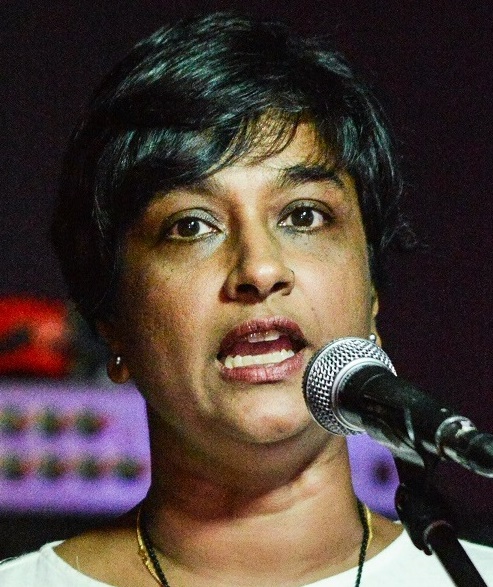Budget 2019 challenges entrepreneur spirit
By Kiran Kaur Sidhu November 3, 2018
- Budget matched or exceeded expectations of panellists
- Digital tax for imported online services will serve to level playing field for local players

FOLLOWING the announcement of Malaysia’s Budget 2019, Digital News Asia’s Karamjit Singh hosted a post-budget commentary featuring Ganesh Kumar Bangah, the chairman of Pikom; Renuka Sena, the cofounder of Proficeo and Jaffri Ibrahim, the CEO of CREST.
 Renuka (pic, right) said that the Budget surprised her because of its shift away from just giving handouts. “I think a lot of it now goes back to the people, SMEs and innovators to think about how to help themselves, as opposed to what is it that the government is giving us. It’s now up to us to see which sectors the government is allocating the money to. How do we in the digital economy now play our role to enhance the initiatives and policies?”
Renuka (pic, right) said that the Budget surprised her because of its shift away from just giving handouts. “I think a lot of it now goes back to the people, SMEs and innovators to think about how to help themselves, as opposed to what is it that the government is giving us. It’s now up to us to see which sectors the government is allocating the money to. How do we in the digital economy now play our role to enhance the initiatives and policies?”
But there is one thing in particular Renuka is keen on seeing. In terms of private sector investment, she says, "Malaysian entrepreneurs now need to be more competitive in order to attract private sector funds. That's the way forward for entrepreneurs in this new Malaysia."
From Ganesh’s perspective, he had little expectations from this year’s Budget due to the post-election news of the huge debt plaguing the nation. “As an entrepreneur, I set in motion the idea that we need to be self-sustaining with or without government support, especially in terms of investment.”
He said he was “surprised, delighted and happy” with the government’s commitment of US$479 million (RM2 billion) in matching investment for venture capital which is double the previous allocation. “Although we still lack tax incentive for corporates, this makes up for it.”
However, he adds that how the US$479 million (RM2 billion) is delivered is key. “We are happy that announcements have been made of funding entering the ecosystem and the strategy of working with the private sector is in place. Now we need to make sure that this money is properly matched and given out.”
Although no digital tax was announced, the government is putting into place a tax for imported online services in 2020 which includes the likes of Spotify, Netflix and even Google, for users of its paid services like Google Business suite. The various non-Malaysian based cloud services will also be hit.
Offering his view, Ganesh (pic, centre right) believes this is a step in the right direction. “It’s good because it helps the local parties. Before, the locals pay sales and service tax (SST) and the foreigners are not taxed. I believe this will actually level the playing field and increase the competitiveness of local companies.”
Another prominent highlight in Budget 2019 is the US$50.3 million (RM210 million) allocation for years 2019-2021 to encourage the transition to Industry 4.0. “It’s great that there is funding and low interest rate loans available because with Industry 4.0 there is capital expenditure.”
Furthermore, the Budget also includes US$2.4 million (RM10 million) to encourage and develop e-sports. Ganesh agreed with Karamjit that the activities should not be focussed solely in urban areas. “Bridging the digital divide is something we need to look at, not just within e-sports, but also across all our industries. For example, how do we build startups in rural areas?”
 Touching on execution, Jaffri said, “While we have good strategy and policy, the transformation would be the biggest challenge.”
Touching on execution, Jaffri said, “While we have good strategy and policy, the transformation would be the biggest challenge.”
With 250 research facilities being underutilised, it was announced that these will be opened to the private sector to use. Jaffri (pic, bottom right) said, “While there has always been a lot of budget for the establishment of labs, there has never been enough allocated for their upkeep. But I’m seeing that the government is getting serious about the labs being accessible to researchers and the industry.”
On the announcement of loans with a 2% interest rate from Bank Pembangunan Malaysia for robotics and artificial intelligence, Jaffri believes this will be useful. “We engage with SMEs that have Industry 4.0 plans, they have an immediate need for this tech.”
Nonetheless, he highlights the main challenge lies in getting people up to speed in terms of skills. Renuka adds, “What will we do to upskill our talent? Who will operate the machines? That is key to Industry 4.0.”
Renuka stresses the need for this entrepreneur-to-entrepreneur coaching and teaching after having first-hand experience in delivering such a programme and seeing the positive impact of it through the Cradle Fund-administered Coach & Grow Programme (CGP).
With many other incentives for entrepreneurs, all eyes will be on the various ministries and agencies that will be tasked with executing the plans in Budget 2019.
Related Stories :


